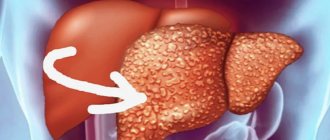From this article you will learn: why and when an ECG is done during pregnancy, what disorders can be detected using this test, and how this examination is carried out.
Author of the article: Nivelichuk Taras, head of the department of anesthesiology and intensive care, work experience 8 years. Higher education in the specialty “General Medicine”.
Article publication date: 04/07/2017
Article updated date: 05/29/2019
Electrocardiography (ECG, cardiogram) is an examination method that can help detect problems with the electrical activity of the heart.
Electrocardiography is performed on a pregnant woman to assess the functioning of the heart under conditions of increasing stress on the body.
During pregnancy, an ECG is recorded for:
- checking the electrical activity of the heart;
- searching for the causes of symptoms of cardiovascular diseases in pregnant women;
- checking the condition of the heart if the expectant mother has other diseases and complications of pregnancy.
During the entire period of bearing a child, every pregnant woman undergoes this test at least once. It is mandatory to record a cardiogram in the third trimester. This is a completely safe examination with no contraindications. A pregnant woman who has any diseases affecting the cardiovascular system needs to undergo this test several times during the entire period of bearing a child - at least in each trimester, and more often if necessary.
Interpretation of examination results in pregnant women is carried out by therapists and cardiologists.
Changes in the cardiovascular system affecting ECG in pregnant women
Pregnancy is stressful for the heart and circulatory system. During pregnancy, the volume of blood in the vascular bed increases by 30–50%, this provides nutrients to the growing baby. The amount of blood pumped by the heart every minute also increases by 30–50%. In addition, the heart rate increases. All these changes make the heart work harder.
Pregnancy also affects the size of the heart and its position in the chest. The enlarged uterus puts pressure on the diaphragm, which moves upward and changes the position of the heart. Its size increases during pregnancy by approximately 12%.
These changes in the size and position of the heart, and its harder work, can lead to the characteristic ECG appearance during pregnancy.
Fetal development in the 1st trimester of pregnancy (1-12 weeks)
10-14 day
delay in menstruation is a reason to consult a gynecologist.
The 1st trimester of pregnancy is considered to be the period of development of the embryo (fetus) from the moment of fertilization of the egg and attachment of the zygote (fertilized egg) to the wall of the uterus until the 12th week.
This stage is characterized by a sequential change
of blastogenesis, organogenesis, placentary
, and also includes
the beginning of the fetal period
, when the fetus has already formed all organ systems, limbs and even the visual appearance of the baby.
It is the 1st trimester of pregnancy that obstetricians and gynecologists call “critical,” because, on the one hand, during this period, the most complex dynamic processes occur in a woman’s body: fertilization, the attachment of the zygote, the formation of all systems of the baby’s body. On the other hand, it is during this period that the fetus is most sensitive to damaging factors, so there is a possibility of pregnancy complications and abnormalities in the development of the fetus, if there are prerequisites for this. Moreover, this risk is even higher than in the 2nd or 3rd trimesters of pregnancy. Non-developing pregnancy
- one of the most significant and common risks that can appear already in early pregnancy.
Mothers who have previously faced the problem of infertility, miscarriage, or ectopic pregnancy
.
The obstetrician-gynecologists of our clinic
will not only conduct prenatal diagnostics themselves as part of a program for monitoring the baby’s development, but will also help correct pathologies in the development of the fetus in a hospital setting.
We manage pregnancies after IVF and have been helping women experience the joy of motherhood for over 20 years.
How is 1-2 weeks of pregnancy going?
Pregnancy period is calculated from the 1st day of the last menstruation
. Pregnancy begins with ovulation and fertilization. At this stage, the zygote attaches to the uterine cavity. It is extremely important that the anatomy (patency) of a woman’s fallopian tubes is not disturbed. The endometrium must be ready to receive a zygote, and there should be no inflammatory processes in the uterine cavity (its mucous membrane) - this increases the likelihood of low placentation. The movement of the zygote through the fallopian tube takes, on average, 2-3 days. Violation of the patency of the fallopian tubes and, in connection with this, the retention of a fertilized egg can cause an ectopic pregnancy.
As part of the planning and management of pregnancy (in the 1st trimester), a woman undergoes ultrasound diagnostics
, and also takes
tests
aimed at identifying such deviations. It is at this stage of pregnancy that it is already possible to determine the fertilized egg in the uterus and, for example, to exclude an ectopic pregnancy.
The main indicator by which pregnancy is diagnosed and its development is further monitored is the hCG level
(human chorionic gonadotropin) in the blood. If the pregnancy test result is positive, the hCG level exceeds 30. Pregnancy can be diagnosed using hCG within 2-4 days after a missed period.
At the initial stage of pregnancy in the 1st trimester, it is extremely important to compensate for the deficiency of nutrients (iron, magnesium, folic acid), which provide the necessary components for fetal growth, and restore hormonal balance. This must be done strictly under the supervision of a doctor and after undergoing tests - spontaneous use of medications, even herbal ones, can cause irreparable damage to the health of the mother and child.*
*
A notorious historical example is the thalidamide disaster of 1961.
How is 3-8 weeks of pregnancy going?
The embryo develops organs: heart, neural tube, intestines, etc. The placenta performs a number of vital functions: nutrition, respiration, excretion, synthesis of hormones and nutrients, blood circulation. The processes of active protein synthesis and embryonic growth factors require a good blood supply from the mother.
Organogenesis from the 3rd week of pregnancy is considered the most important and risky period of development. Any internal failure in the ligament: “mother - placenta - developing organs of the embryo”
can lead to fatal developmental defects.
At 6-7 weeks
During pregnancy, ultrasound diagnostics can already record the baby’s heartbeat.
At 7-8 weeks
During the 1st trimester of pregnancy, the fetus's limbs are formed, the process of embryogenesis is completed - this means that the embryo has all its organs and tissues formed in its infancy.
The period of 7-8 weeks is optimal in order to undergo the first large-scale clinical and laboratory examination and register.
You can contact our clinic regarding pregnancy management in the 1st trimester - we will issue an exchange card for the expectant mother and help her undergo modern diagnostics in a comfortable environment.
How is the 9th - 12th week of pregnancy?
The stage of active growth and complexity of the baby’s body. The fetus develops a lymphatic system and complex reflexes appear - the child can cover his face with his palms, or bring his thumb to his mouth.
Thus, in the 1st trimester of pregnancy, the most important and significant changes occur in a woman’s body - it begins to work literally for two, directing resources to the active growth and development of the fetus. To ensure good blood circulation, the work of the heart increases. To ensure that the baby receives the necessary amount of oxygen, pulmonary ventilation becomes more intense. The kidneys are now responsible for removing waste products from the mother and fetus. The uterus increases in size, which often leads to stagnant movements in the intestines - constipation. Taste sensations change; a woman may experience nausea and toxicosis
in the 1st trimester of pregnancy. Mild toxicosis in early pregnancy is treated with medication. Moderate and severe toxicosis in the 1st trimester of pregnancy is treated in a day hospital (for example, using hormonal infusion therapy).
It is important that the expectant mother not only undergoes examinations according to the program, but also receives support. When contacting our clinic regarding pregnancy management in the 1st trimester, you can count on the help of highly professional obstetricians and gynecologists, constant feedback from the doctor, and the European level of medical service.
Preparing to take a cardiogram
In order for the test to pass as quickly and efficiently as possible, the following tips may be useful:
- Tell your doctor about all the medications you are taking, as many of them may affect the test results.
- Instead, wear clothes that are easy to take off or unbutton at the chest.
- On the day before the test, no creams should be applied to the skin, as they affect electrical conductivity.
- Remove all jewelry from your neck and arms in advance.
- Ask your doctor any questions you have about this test, its risks, and its results.
No special preparation is needed to record an ECG. Immediately before the test, you should avoid physical activity and do not drink cold water.
What is an ECG and how is it done?
Electric fields are generated as the heart operates. A diagnostic method based on their recording is called electrocardiography. The graph on the electrocardiogram displays the process of depolarization of the atrial myocardium, depolarization of the ventricles, and repolarization of the ventricular myocardium.
To diagnose the electrical fields of the heart muscle, a special device is used - an electrocardiograph. The patient lies down on a couch and 6–9 recording electrodes are attached to his chest. Electrodes are also applied to the patient’s limbs, the right leg is used for grounding. To avoid interference, a conductive gel is applied to the skin.
The electrocardiogram is recorded on thermal paper, the speed is usually 50 mm/s. A graph is drawn on paper, which is subsequently deciphered by a therapist or cardiologist.
How is the examination carried out?
Typically, an ECG during pregnancy is carried out in a medical institution - a clinic, outpatient clinic, hospital. Since the machine itself that records the cardiogram is portable, this test can be performed almost anywhere.
During the examination:
- You will have to lie down on a couch or bed, exposing the chest, forearm and lower leg area.
- The healthcare professional applies a special gel to the skin of these areas that reduces electrical resistance.
- Electrodes are attached to the skin of the arms, legs and chest, which are connected to a machine that records the electrical activity of the heart on paper.
- During the test, you need to lie still and breathe normally. Sometimes your healthcare provider may ask you to take a deep breath and hold your breath. You cannot speak during the examination.
- You need to relax and not tremble, as any movement can affect the result.
- After recording is completed, the electrodes are removed from the skin and the gel is wiped off.
The duration of ECG recording rarely exceeds 10 minutes. After this, the electrodes are removed from the skin.
Pregnancy management after IVF in the 1st trimester
The pregnancy management program after IVF in the 1st trimester may differ slightly from the usual one. Firstly, the woman continues to be observed at the IVF center by a fertility specialist until 6-7 weeks, when the doctor can record the heartbeat of the embryo. Only after this can the expectant mother contact an obstetrician-gynecologist. At the first stage, the doctor decides on the advisability of maintenance hormonal therapy
, prescribed earlier at the IVF center. Whenever possible, we try to either reduce or eliminate additional hormonal therapy.
Thus, monitoring of pregnancy after IVF begins at an earlier stage, and the program can be adjusted depending on the characteristics of the individual case: is it a singleton or multiple pregnancy, what problems should be taken into account, etc.
Diseases that can be detected using an ECG
Registration of an ECG during pregnancy helps diagnose many heart diseases in expectant mothers. With this test, doctors can detect:
- fast or slow heartbeat;
- heart rhythm disturbances (arrhythmias);
- disturbances in the passage of electrical impulses in the heart (blockade);
- an increase in the size of the heart and thickening of its walls (hypertrophy);
- the cause of heart disease symptoms (eg, shortness of breath, heart pain, dizziness, fainting);
- signs of congenital heart defects in a pregnant woman;
- signs of electrolyte disturbances (increased or decreased levels of potassium, magnesium, calcium in the blood).
Pregnancy management program in the 1st trimester
The examination plan during the 1st trimester of pregnancy was developed strictly in accordance with the regulatory documents of the Ministry of Health of the Russian Federation and does not contain “unnecessary” examinations.
The pregnancy management program includes:
- An initial consultation with an obstetrician-gynecologist, as well as a repeat consultation based on the results of the examinations completed,
is your chief physician and mentor. At the first consultation, the doctor examines the expectant mother’s medical history, gives a referral for examination, and helps in resolving the most significant issues based on the data obtained about the woman’s health condition. A repeat appointment is scheduled after a prenatal ultrasound and biochemical screening. The obstetrician-gynecologist registers the patient for pregnancy, fills out all the documentation, and gives recommendations. - Appointment with a general practitioner
- this doctor will help assess your general health, predict the risks of developing the most likely diseases during pregnancy and take timely measures. This is very important because during pregnancy a woman is strictly limited in taking medications and drugs. - ECG (electrocardiogram)
- allows you to assess the condition of the heart and identify pathologies: rhythm disturbances, blood circulation. - Appointment with an ENT doctor
- no woman is insured against diseases of the ear, nose and throat (colds, acute respiratory viral infections, sore throats), so it is important to carry out sanitation in a timely manner to avoid drug treatment during pregnancy. - Consultation with an ophthalmologist
- the doctor checks vision and evaluates the condition of the retina, and also determines whether the woman can give birth on her own or by cesarean section. Not only childbirth can affect vision, but toxicosis and other complications of pregnancy. - Ultrasound of the kidneys and bladder
- allows you to assess the condition of internal organs, identify hidden diseases (inflammatory, urolithiasis) and neoplasms. - Pelvic ultrasound
helps to study the anatomy of the pelvic organs, identify gynecological diseases and possible risks of complications. - Fetal ultrasound (performed by a perinatologist at 11-14 weeks of pregnancy)
allows you to see for the first time during pregnancy how the baby is growing and whether everything is fine. - Biochemical blood test
- study of more than 15 important indicators (sugar, protein, iron, etc.). - A general blood test
is the most important test, as a result of which the doctor obtains indicators of platelets, hemoglobin, red blood cells, etc., and then can accurately assess the general condition of the expectant mother’s body. - A general urine test
allows you to evaluate how the kidneys and urinary system work, as well as identify pathologies such as gestosis and eclampsia. - Blood group
- the analysis allows you to answer the question of whether there is a Rh conflict in the blood type of mother and baby. - A blood test for hormones
is a very important test that provides an understanding of the specifics of metabolism and allows one to predict how the fetus will develop. - Testing for HIV, syphilis, hepatitis B, C
is mandatory for the expectant mother. - PRC diagnostics
is a laboratory analysis aimed at identifying many hidden infectious pathogens (from pneumonia to herpes). - Laboratory examination of a gynecological smear
- analysis of the microflora of the vagina, cervical canal, urethra allows us to identify hidden inflammatory processes and their causative agents (gonococcus, trichomonas) - Biochemical screening (PAPP-A, hCG, risk calculation)
is a very important examination that allows you to assess the risk of chromosomal pathology, obtain the most important indicators of fetal development, and also answer the question of whether it is advisable to prescribe invasive diagnostic methods. - Extended coagulogram with determination of lupus type At+
- allows you to assess the risk of thrombosis and bleeding, which can lead to miscarriage.
Find out more about pregnancy management at the Pirogov Clinic (St. Petersburg)
Processing ECG results
Interpretation of a cardiogram recording requires quite a lot of experience from the doctor. The results of the examination will be known on the day of its conduct; decoding usually takes no more than 10–15 minutes.
In his conclusion, the doctor indicates the nature of the heart rhythm, the frequency of heart contractions, the electrical axis of the heart (characteristics of the position of the heart), and describes existing disturbances in electrical conductivity (if any). Diagnosis is not made solely on the basis of a cardiogram; symptoms and signs of the disease are also taken into account.
Advantages of pregnancy management in our clinic
The Department of Gynecology and Obstetrics of the Pirogov Clinic on Vasilievsky Island (St. Petersburg) is among the TOP 3 best in the city according to the results of the VIII and IX ranking of private clinics (2018-2019). You can view reviews about pregnancy management on our website, as well as on independent platforms. By contacting us, you can be sure of high diagnostic standards and professionalism of doctors. We offer our patients:
- Services of experienced, attentive and caring obstetricians-gynecologists - our specialists worked and improved their skills in clinics in Finland, France, the USA, as well as in maternity hospitals in St. Petersburg.
- Having your own laboratory and all specialized doctors in one place, as well as medical offices equipped with new generation equipment. You can undergo all examinations in a comfortable environment and without queues. We guarantee the reliability of the results. There is no need to come pick them up - we will send everything by email.
- Remote video consultations with gynecologists (online).
- Affordable prices for pregnancy management in the 1st, 2nd, 3rd trimesters.
- Possibility of paying for services in installments.
- The clinic is located on Vasilyevsky Island - in a picturesque historical area not far from the station. m. Vasileostrovskaya.
- Pregnancy management under VHI.
You can make an appointment with a gynecologist through our website or by calling 320-70-00.
Features of a cardiogram in pregnant women
Changes in the cardiovascular system characteristic of pregnancy change the character of the cardiogram, especially in the later stages.
ECG of pregnant women is characterized by:
- Increased heart rate.
- Shift of the electrical axis to the left.
- Shortening the PR interval.
- Negative T wave in leads III, V
- Pathological Q wave in leads III, aVF.
It should be remembered that all these characteristic features of the ECG during pregnancy are not observed in all women.
How to prepare for an ECG during pregnancy?
In fact, there are no specific recommendations for proper preparation for an ECG. A woman should not eat or drink right before the examination, or do physical activity. Before starting the procedure, breathing should be calm and completely normalized. What does an ECG look like during pregnancy? This is the same procedure as for conventional electrocardiography. The most important are the ECG electrodes, which should be placed in the correct places on the chest, upper and lower extremities. The sent impulses record the work of the heart, creating a graphic image on a monitor screen or on printed graph paper.
Limitations of ECG
Like many diagnostic methods, ECG has certain disadvantages and limitations:
- This is a static method and may not reflect existing heart problems if there are no symptoms at the time of recording.
- Many pathological changes on the cardiogram can be nonspecific, that is, observed in various diseases. To clarify the diagnosis in such cases, additional examinations are carried out.
- In some heart diseases, the cardiogram may be completely normal.
How is electrocardiography performed?
Some visitors to medical institutions do not know how electrocardiography is performed:
- 1. The office has a couch on which the study is performed.
- 2. The doctor attaches the electrodes to the chest and limbs.
- 3. Next, you should lie in a calm position, as the device operates and records the readings of the heart muscle. The information is displayed on a computer monitor and then printed on paper.
Our clinic specialists interpret the results. The conclusion is given to the person examined - the process takes from 15 to 30 minutes. If necessary, you can get advice from an experienced cardiologist at the center.










